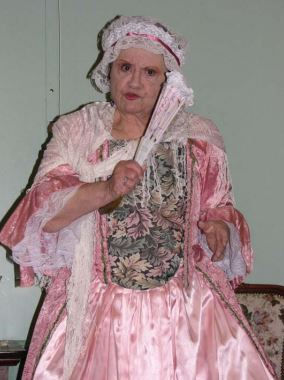Storyteller Libby Franck portrays ‘Agnes Surriage’
- Cathy Buday
- Jul 20, 2016
- 3 min read

If the National Enquirer had existed during the 1700s, Agnes Surriage and Sir Charles Henry Frankland would surely have been regulars on the front page, with headlines like: “Harry’s family snubs ‘slut from Marblehead,’” and “Wild wassailing at Hopkinton manse.”
Agnes, a fisherman’s beautiful teenaged daughter, in 1741 caught the eye of the older aristocrat “Harry” Frankland, who saw her scrubbing floors in a Marblehead tavern and immediately fell in love. Harry made Agnes his ward and traveled with her but didn’t marry her. The couple quickly became a source of both fascination and scorn in post-Puritan Boston.
Professional storyteller Libby Franck, in the persona of Agnes, shared her stories with an appreciative crowd at the Hopkinton Historical Society on March 3. Franck, who portrayed Agnes as an older woman reviewing highlights of her life, recounted the onetime floor-scrubber’s changing roles: gossiped-about ward, charming hostess, respectable wife and mother, grieving widow and remarried woman.
As Agnes, she recalled tender moments, such as when Harry brought her a white rose. “I always knew that you would turn out like this, from scrubbing the floor to dancing on it,” he said, calling Agnes “the lovely rose that I am cultivating.”
But she also remembered the Britain-based Frankland family’s coldness, and worrying that Harry would leave her for a wealthier woman, like his brother’s fiancée. She also remembered attending a Frankland family party where “nobody noticed me” except for someone muttering “whatever is he still doing with that slut from Marblehead?
Still, Harry’s love prevailed and the two escaped Boston gossip to settle in Hopkinton, which Agnes recalled as “truly the golden age of Harry and Agnes.”
“We had orchards and flowers, fox hunts and wassail parties,” she said. “All the celebrities of England came here, and we brought my family here too. Our son Henry Cromwell lived with us.”
Just before a trip to Portugal, she and Harry stopped in England and attempted to visit a wealthy relative but a snooty butler barred them from entering the front door, telling them nobody was home. Agnes knew better. “He looked at me like I was a piece of cod left in the sun for a week,” she said.
Harry finally proposed to Agnes during their stay in Portugal. “Harry said to me, ‘I think we’d do better if we were married,’” Agnes recalled. As Harry’s wife, Agnes finally got a warmer reception from the Frankland family.
A second trip to Portugal was equally earth-shaking, but for another reason. The couple narrowly survived an earthquake that leveled the home where they had been staying. Agnes heard Harry’s voice from beneath a pile of rubble; and rescuers fortunately got to him in time.
The couple would go on to buy another home, in Boston’s North End, where they hosted glittering parties for government officials and socialites, who finally accepted the fisherman’s daughter as Lady Frankland. As Harry grew older, the couple would spend more time at their Hopkinton farm, where Harry eventually died.
Agnes moved back to Boston just before the Revolutionary War, and watched the Battle of Bunker Hill from the window of her North End home. Later she sailed to Chichester, England, where her son Henry Cromwell Frankland had married and settled. She lived in Chichester and eventually remarried banker John Drew.
Not long after her second wedding, Agnes felt a pain in her arm – the beginning of a fatal heart attack. She was buried in Chichester, across the ocean from her first husband. “Back then, as Benjamin Franklin would say, you were buried where you dropped,” she recalled.


















Comments